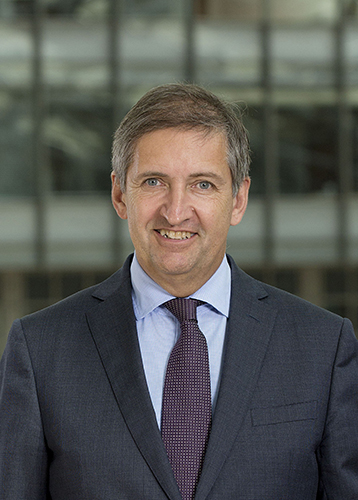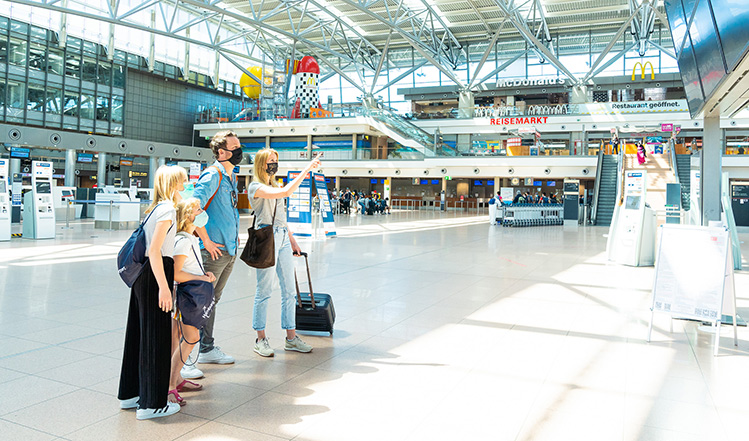An interview with Michael Eggenschwiler, CEO Hamburg Airport. By Ross Falconer
Hamburg Airport responded very quickly to the COVID-19 pandemic, with a comprehensive package of measures designed to ensure that all processes, from check-in to boarding, comply with the current recommendations for infection control. This includes clear social distancing rules and enhanced hygiene and cleaning regimes.

Michael Eggenschwiler, CEO Hamburg Airport: “Passengers can purchase face masks, disinfectant wipes and disinfectant gels for their travels at self-service kiosks. For non-contact check-in, the airlines offer mobile check-in facilities, as well as the check-in and self bag drop kiosks at the airport.”
“In this way, we ensure that safe travel is always possible at Hamburg Airport,” says Michael Eggenschwiler, CEO Hamburg Airport. “It is important to us that all passengers and visitors at the airport feel comfortable and safe. Recently, Hamburg Airport was recognised as a 4-star airport by Skytrax for its exemplary response to COVID-19.”
Face masks are mandatory in the terminals, and cleaning teams and mobile service personnel pass through the terminals regularly.
Meanwhile, to help travellers comply with the now-familiar hygiene rules during their time at the airport, there are Perspex screens, hand disinfectant dispensers, informative posters, and floor markings.
“Passengers can purchase face masks, disinfectant wipes and disinfectant gels for their travels at self-service kiosks,” Eggenschwiler explains. “For non-contact check-in, the airlines offer mobile check-in facilities, as well as the check-in and self bag drop kiosks at the airport. With a mobile service team in the terminals and on the Passenger Pier, the airport is providing additional support and information for all passengers. These are just a few examples of the many measures, large and small, that we have taken to protect passengers, visitors and, of course, our workforce.”
There is a COVID-19 test centre at Hamburg Airport operated by biotech company Centogene. “The airport supports this service because modern testing technology provides solutions that ensure safe travel even in these difficult times,” says Eggenschwiler. “Demand for the test centre is strong. People want to remain mobile and so are making use of the services available.”
“Working to ensure that mobility and ecology can go hand-in-hand”
Environmental protection has long been a focus for Hamburg Airport. The airport is currently accredited at Level 3 Optimisation of ACI’s Airport Carbon Accreditation, and by the end of 2021 its target is to be the first airport in Germany to reach Level 3+ Neutrality.
“As one of the steps we are taking to reach this goal, we are further strengthening our commitment to alternative fuel sources,” Eggenschwiler explains. “There must also be improvements to the energy efficiency of our own facilities. Our personnel want to be role models, working every day to ensure that mobility and ecology can go hand-in-hand.”
Within the aviation sector, there is intensive ongoing research into the development of alternative fuels. “Our aim is to see such fuels being used in Hamburg as soon as possible, and so we as an airport are supporting the innovative ‘KEROSyN100’ and ‘GreenPower2Jet’ projects,” Eggenschwiler comments. “Furthermore, Hamburg Airport’s modern Schedule of Fees & Charges contains incentives for the airlines to deploy larger aircraft with efficient technologies. This reduces per-passenger kerosene consumption.”
‘KEROSyN100’ is the only project of its kind in Germany. The project partners, including Hamburg Airport, have signed a Memorandum of Understanding for the production and purchase of synthetic kerosene. Surplus wind energy from the region is used to produce the fuel, and the goal is for 5% of the kerosene used at Hamburg Airport to be synthetic within five years.
Plans are also in place to convert the entire fleet of baggage tugs to hydrogen power. “The airport started using alternative fuels for its baggage tugs 18 years ago,” Eggenschwiler explains. “There are numerous opportunities for using this leading-edge technology at the airport. The energy transition cannot succeed without hydrogen.”
In addition, more than 80% of Hamburg Airport’s surface vehicles today operate with alternative and/or synthetic fuels. “In the future, all viable alternative fuels will be used, and further innovative technologies will be implemented,” says Eggenschwiler. “Since the end of 2016, all diesel-powered vehicles at Hamburg Airport use a synthetic, zero-emissions fuel. Hamburg was the first airport in the world to achieve this.”
Hamburg Airport also makes an important contribution to species protection and biodiversity, with the airport site providing largely undisturbed habitats for animal and plant species. “Indeed, we have the largest contiguous green space in Germany’s second-largest city,” Eggenschwiler notes. “130 vertebrate species have been identified on the airport premises. Our environmental experts are involved in various projects focused, for example, on protecting communal and honey bees, and providing a home for rare kingfishers.”
Meanwhile, travellers are able to make a discretionary donation to a regional environmental project to compensate for the CO2 emissions of their flight. Hamburg Airport is the first in Germany to offer such a local platform. The climate donation is voluntary, and the passenger can choose the amount.

Hamburg Airport responded very quickly to the COVID-19 pandemic, with a comprehensive package of measures designed to ensure that all processes, from check-in to boarding, comply with the current recommendations for infection control. This includes clear social distancing rules and enhanced hygiene and cleaning regimes.
€120 million main apron refurbishment
Refurbishment of the airport’s main apron was recently completed. The four-year project was undertaken during ongoing operations and completed within the allocated time and budget.
“We are the oldest commercial airport worldwide to still operate from its original location,” says Eggenschwiler. “This investment of around €120 million had become necessary because the concrete surfaces were between 40 and 60 years old, and their usability would have come to an end in the foreseeable future. At the same time, the airport was able to implement the structural requirements for such future-oriented projects as the innovative ‘Follow the Greens’ guidance system and landside power facilities on the apron.”
Identifying areas for cost-efficiency improvement and revenue growth
The crisis arising from the COVID-19 pandemic, which encompasses all of the world’s economic sectors, is particularly hard on companies in the aviation industry. “Air travel has been brought almost completely to a standstill,” says Eggenschwiler. “Companies are facing high overheads without generating revenue. It is not yet clear when air travel will resume in Europe. What is clear, though, is that we will not see the traffic volumes forecast at the end of 2019. For the coming years, too, a significant decline in aircraft movements and passenger volume must be expected. One of our key aims is, therefore, to see aviation recover as quickly as possible once the pandemic situation calms down.”
The commercial basis for this has to be put in place, and Eggenschwiler adds that, in view of the dynamic, highly volatile market environment, Hamburg Airport had already launched an efficiency programme in 2019. “This programme identifies areas for cost-efficiency improvement and revenue growth. Today, we are benefiting from this 12-month head-start, which puts us in a position where we can recover from the crisis somewhat more quickly than others.”







